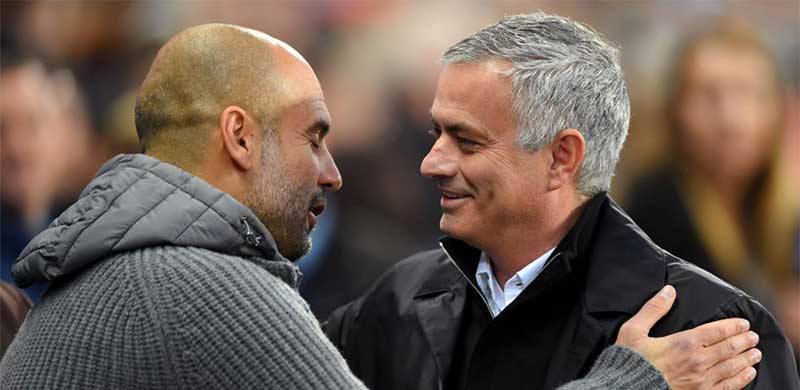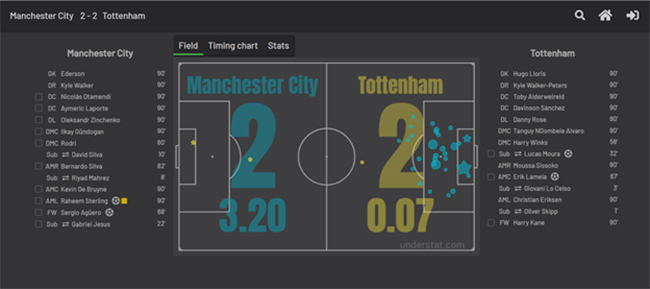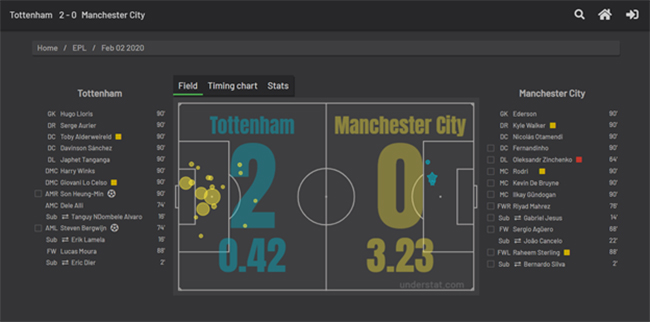
Last Sunday, Tottenham Hotspur fans witnessed their side’s first statement victory at the new stadium as they beat Pep Guardiola’s Manchester City by two goals to nil. Perhaps it was no coincidence that this statement win was delivered by the modern master of this archetype, Jose Mourinho. It was definitely no coincidence that this victory had his name written all over it.
It is safe to say, even without getting into any statistics or numbers at the moment, that, in a way, Mourinho’s mantra prevailed: “whoever has the ball is more likely to make a mistake.” As proven by the fact that Manchester City did have the ball - loads of it. And they did make multiple mistakes, with Mourinho’s side pouncing on the opportunities. Spurs showed that if you stay in the game for long enough, you will get one good chance, at least, to get a result.
This approach is a far cry away from one employed by the person in the opposing dugout, Pep Guardiola. His outlook can very broadly be defined as, “he who has the ball has control.”
It is only fitting that the most iconic managerial rivalry of the modern era is between two individuals who represent polar opposites on a spectrum - in both ideology and practicality.
Action and reaction. Order and chaos. Purist and nihilist. Yin and yang.
The two (who used to be friends) started off in the same place and consumed broadly the same teachings. They ended up taking completely different, yet somehow interwoven, paths that led them to become bitter rivals.
Last Sunday their paths collided yet again, and it was one of the rare occasions when Jose trumped Pep. Rare, but iconic. As they have always been.
Why are they iconic? Maybe it’s because of the winning manager celebrating like a striker who has scored a goal after beating Guardiola’s Barcelona in the Champions League semi-final. Maybe it’s because Guardiola and his meticulous and borderline obsessive possession-football rubs some people the wrong way and beating him therefore gets a bigger cheer than beating other managers. Maybe defeating him using methods and ideas that are completely opposite to what he stands for and believes in is even more worthy of celebration.
Mourinho has ticked all these boxes, and he has done it enough times to matter.
The Portuguese once again won the battle against Guardiola in their latest meeting last Sunday. There is no doubt about that whatsoever. But did we witness a Mourinho masterclass?
On the face of it, City’s five shots on target, zero goals and 67 percent possession will point you to the fact that Mourinho’s side kept frustrating Guardiola’s, who did not do much with the enormous amount of time they had the ball, and eventually suckerpunched them to win 2-0.
Dig a little deeper, or watch the first 60 minutes of the match, and the story changes. For reasons that could be, at best, indescribable or, at worst, paranormal, this was very much like the remarkably bizarre reverse fixture of these sides back in August, where City had 30 shots to Spurs’ three, and the final score was 2-2.

City’s expected goals (xG), in both matches, were over 3.0 while Spurs’ were less than 0.5. Simply put, if the game was repeated 1000 times, City would, on average, score above three goals while Spurs would have less than a goal every game.

City also had four “big chances” as defined by Opta, including a penalty. They failed to score from all of them. They had 50 touches and 14 shots inside Spurs’ penalty box and also hit the woodwork twice. By 55 minutes, City’s players, Pep Guardiola and the travelling fans all probably had the simultaneous feelings that their efforts warranted at least three goals and also that they were not going to score that night. Their feelings were spot on.
Going back to Mourinho’s mantra, “whoever has the ball is more likely to make a mistake,” it seems like the only mistake the attacking side made was to not score from incredibly promising chances.
This is why I think it is a stretch to say this victory was the product of Mourinho’s meticulous planning and his team’s attentive execution. A masterclass is loosely defined as an expert providing a lesson in an artform or subject. You cannot count this as a masterclass, unless getting cut open time and again and somehow surviving is an artform that can be taught. It would be a masterclass if 60 minutes had passed and Manchester City were getting frustrated and annoyed at the lack of ideas about how to penetrate the Spurs defence. A masterclass would be akin to how his Inter Milan side set up in both Champions League semi-final legs against Guardiola’s Barcelona, especially the first one.
Oddly enough, Spurs played much better against Liverpool a few weeks ago yet somehow still lost. They did not allow the current league leaders to create many clear-cut chances (Liverpool’s xG was under 2.0) apart from two big chances for Roberto Firmino and Alex-Oxlade Chamberlain in the initial stages of the game. If anything, that game and this recent one show the difference between Liverpool and Manchester City this season, and provides a decent explanation for the 22 point gap - a ruthless cutting edge, with the ability to take chances and kill games off.
In both matches though, the fact of the matter is that Mourinho’s side were still very much in the game going into the last half hour, and in both matches, they had chances to get a result. In one match, they were ruthless and made the most of their luck, for which they deserve their fair share of credit, while in the other they were ironically unlucky not to score.
And that, really, is the brunt of the matter. Football is full of ironies and complexities. It is a funny old game. Its top-level matches operate on the finest of fine lines. If Manchester City had taken even two of their seemingly countless chances, this would definitely have been a Guardiola masterclass. His side’s performance had everything else but the goals. Mourinho’s side had the goals but nothing else. And like they say, “goals win you games.”
Masterclass or not, this does prove Mourinho’s point in a way. This type of wins do provide legitimacy to Mourinho’s view of chaos and inherent randomness in the system. Even with all the tactics and patterns and control on your side, as Guardiola had on his, there remain elements of pure randomness, luck and disorder that can instantly turn a match on its head and leave you scratching the top of yours.
As Jonathan Wilson put it: “football [cannot and] will not be tamed.”
It is safe to say, even without getting into any statistics or numbers at the moment, that, in a way, Mourinho’s mantra prevailed: “whoever has the ball is more likely to make a mistake.” As proven by the fact that Manchester City did have the ball - loads of it. And they did make multiple mistakes, with Mourinho’s side pouncing on the opportunities. Spurs showed that if you stay in the game for long enough, you will get one good chance, at least, to get a result.
This approach is a far cry away from one employed by the person in the opposing dugout, Pep Guardiola. His outlook can very broadly be defined as, “he who has the ball has control.”
Also read: Solskjaer And Lampard Might Have A Few Similarities, But Lampard Is Far Better. Here’s Why
It is only fitting that the most iconic managerial rivalry of the modern era is between two individuals who represent polar opposites on a spectrum - in both ideology and practicality.
Action and reaction. Order and chaos. Purist and nihilist. Yin and yang.
The two (who used to be friends) started off in the same place and consumed broadly the same teachings. They ended up taking completely different, yet somehow interwoven, paths that led them to become bitter rivals.
Last Sunday their paths collided yet again, and it was one of the rare occasions when Jose trumped Pep. Rare, but iconic. As they have always been.
Why are they iconic? Maybe it’s because of the winning manager celebrating like a striker who has scored a goal after beating Guardiola’s Barcelona in the Champions League semi-final. Maybe it’s because Guardiola and his meticulous and borderline obsessive possession-football rubs some people the wrong way and beating him therefore gets a bigger cheer than beating other managers. Maybe defeating him using methods and ideas that are completely opposite to what he stands for and believes in is even more worthy of celebration.
Mourinho has ticked all these boxes, and he has done it enough times to matter.
The Portuguese once again won the battle against Guardiola in their latest meeting last Sunday. There is no doubt about that whatsoever. But did we witness a Mourinho masterclass?
Also read: Sticking With Hasenhuttl Is Southampton’s Best Decision Since Mauricio Pochettino’s Appointment
On the face of it, City’s five shots on target, zero goals and 67 percent possession will point you to the fact that Mourinho’s side kept frustrating Guardiola’s, who did not do much with the enormous amount of time they had the ball, and eventually suckerpunched them to win 2-0.
Dig a little deeper, or watch the first 60 minutes of the match, and the story changes. For reasons that could be, at best, indescribable or, at worst, paranormal, this was very much like the remarkably bizarre reverse fixture of these sides back in August, where City had 30 shots to Spurs’ three, and the final score was 2-2.

City’s expected goals (xG), in both matches, were over 3.0 while Spurs’ were less than 0.5. Simply put, if the game was repeated 1000 times, City would, on average, score above three goals while Spurs would have less than a goal every game.

City also had four “big chances” as defined by Opta, including a penalty. They failed to score from all of them. They had 50 touches and 14 shots inside Spurs’ penalty box and also hit the woodwork twice. By 55 minutes, City’s players, Pep Guardiola and the travelling fans all probably had the simultaneous feelings that their efforts warranted at least three goals and also that they were not going to score that night. Their feelings were spot on.
Going back to Mourinho’s mantra, “whoever has the ball is more likely to make a mistake,” it seems like the only mistake the attacking side made was to not score from incredibly promising chances.
This is why I think it is a stretch to say this victory was the product of Mourinho’s meticulous planning and his team’s attentive execution. A masterclass is loosely defined as an expert providing a lesson in an artform or subject. You cannot count this as a masterclass, unless getting cut open time and again and somehow surviving is an artform that can be taught. It would be a masterclass if 60 minutes had passed and Manchester City were getting frustrated and annoyed at the lack of ideas about how to penetrate the Spurs defence. A masterclass would be akin to how his Inter Milan side set up in both Champions League semi-final legs against Guardiola’s Barcelona, especially the first one.
Oddly enough, Spurs played much better against Liverpool a few weeks ago yet somehow still lost. They did not allow the current league leaders to create many clear-cut chances (Liverpool’s xG was under 2.0) apart from two big chances for Roberto Firmino and Alex-Oxlade Chamberlain in the initial stages of the game. If anything, that game and this recent one show the difference between Liverpool and Manchester City this season, and provides a decent explanation for the 22 point gap - a ruthless cutting edge, with the ability to take chances and kill games off.
In both matches though, the fact of the matter is that Mourinho’s side were still very much in the game going into the last half hour, and in both matches, they had chances to get a result. In one match, they were ruthless and made the most of their luck, for which they deserve their fair share of credit, while in the other they were ironically unlucky not to score.
And that, really, is the brunt of the matter. Football is full of ironies and complexities. It is a funny old game. Its top-level matches operate on the finest of fine lines. If Manchester City had taken even two of their seemingly countless chances, this would definitely have been a Guardiola masterclass. His side’s performance had everything else but the goals. Mourinho’s side had the goals but nothing else. And like they say, “goals win you games.”
Masterclass or not, this does prove Mourinho’s point in a way. This type of wins do provide legitimacy to Mourinho’s view of chaos and inherent randomness in the system. Even with all the tactics and patterns and control on your side, as Guardiola had on his, there remain elements of pure randomness, luck and disorder that can instantly turn a match on its head and leave you scratching the top of yours.
As Jonathan Wilson put it: “football [cannot and] will not be tamed.”
